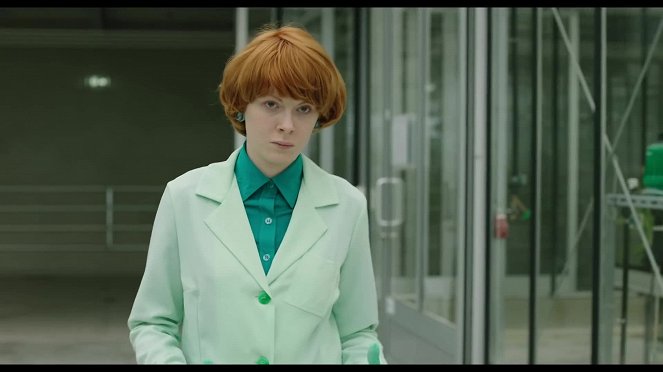Réalisation:
Jessica HausnerPhotographie:
Martin GschlachtActeurs·trices:
Emily Beecham, Ben Whishaw, Kerry Fox, Kit Connor, David Wilmot, Phénix Brossard, Sebastian Hülk, Lindsay Duncan, Jessie Mae Alonzo, Marie Noel (plus)VOD (4)
Résumés(1)
Against company policy, plant breeder Alice takes home a newly created species as a gift for her teenage son, Joe. They christen it 'Little Joe' but as it grows, so too does Alice's suspicion that her new creations may not be as harmless as their nickname suggests... From visionary director Jessica Hausner, Little Joe is a cool, witty and unsettling sci‐fi starring Emily Beecham and Ben Whishaw. (British Film Institute (BFI))
(plus)Vidéo (2)
Critiques (4)
Un potentiel inexploité. Une forme futuriste engageante adaptée à un cadre stérile et une intrigue intéressante qui aurait pu être développée de X manières avec Y résultats possibles. Et peu importe qu'il soit resté intimiste et peu ambitieux, ou qu'il n'ait pas rempli les attentes du genre suggéré. Ce qui dérange, c'est que dans la seconde moitié, il soit deux longueurs derrière le public en termes d'intelligence et transforme l'héroïne principale, qui est le lien le plus sûr du public avec le danger qui se développe dans l'histoire, en une imbécile aveugle. [Cannes]
()
« Little Joe » est une fleur développée en laboratoire. Avec un peu de soin et d’affection, elle vous rendra heureux. Il s’agit d’un concept original et ambitieux, dont le potentiel a malheureusement été gâché. Le film semble terne, fade, et pourtant l’intrigue invitait à l’exagération et à la paranoïa. C’est probablement ce qu’essaie de faire l’accompagnement « musical » du film, qui fait presque penser à celui d’un film d’horreur par moments, mais qui ressemble malheureusement plus à un mélange aléatoire de carillon, de flûte et de sifflements de type acouphène, qu’à de la musique. Le jeu des acteurs est un peu froid dans l’ensemble, ce qui n’aurait été utile, par rapport à l’intrigue, que dans la seconde moitié du film. Là où le scénario et la bande sonore échouent, le côté visuel, en revanche, est une réussite. Les couleurs pastel vont très bien au film. Le vert clair, la rouille et le blanc créent un contraste parfait avec la dangereuse fleur rouge foncé. Hélas, de beaux visuels ne suffisent pas pour une expérience de cinéma complète.
()
Luck is a fickle thing, so why not help it through the possibilities of genetic engineering. Little Joe is a fairly intimate film that tries to build an oppressive, almost uncomfortable atmosphere as it goes along, which it succeeds in doing mainly thanks to the ethnic-horror music (a strange combination, but somehow I needed to call it that) and the greenhouse spaces, which, despite their glassy brightness, in this case seem exceedingly hostile and "dark". On the one hand, you can see an upraised index finger pointing towards the limitless possibilities of genetic engineering, but on the other hand, you can also find a parallel to the (non-)violent promotion of leading ideas in society (in this case for survival). I was very impressed by the work with space and the camera, which seems to deliberately try to neglect the characters. However, despite the very original premise, I felt that it was not used to its full potential, remaining dormant rather than blossoming into its full glory. Still, it is an emotionally disturbing film.
()
Besides Vivarium, Little Joe is another film in the Cannes programme that would have worked better as an episode of The Twilight Zone. In comparison to the hopeless Vivarium, however, Little Joe is better developed and directed, though no less predictable. If we take Jordan Peele as the benchmark, Little Joe doesn’t come at all close to his work, including Us. Hausner simply set out on a career path, shooting a mercenary project that comes across as a more sedate variation on Invasion of the Body Snatchers, except in Little Joe the theme of unadulterated egocentric happiness replaces the fear of communism found in the original Body Snatchers from 1956 and the psycho paranoia of the 1978 remake. Nevertheless, any overlaps and ideas on this theme reach beyond the film itself, without being conveyed in the narrative. As it happens at festivals, Little Joe gets a fine context as a double feature with Loach’s Sorry We Missed You, which contains some similar elements and motifs, albeit conceived and developed in a completely different way.
()



Annonces